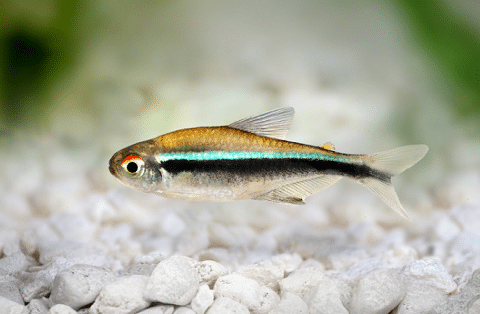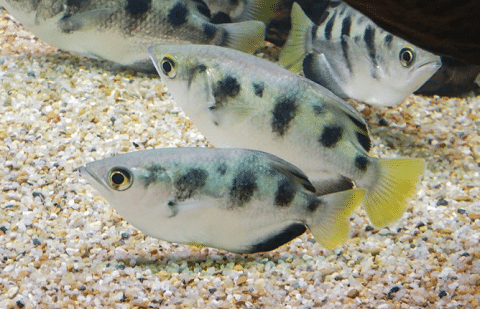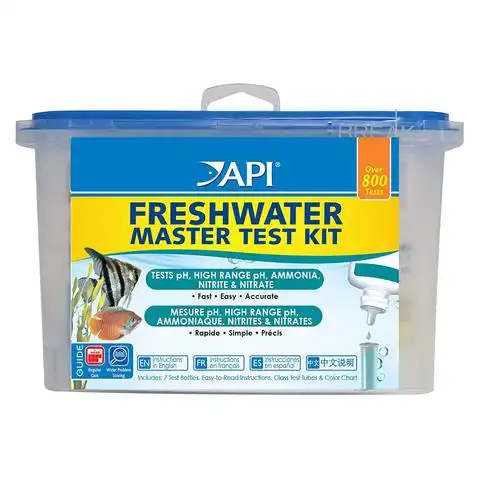Thank you for visiting! By the way… any links on this page that lead to products on Amazon and other stores/partners are affiliate links Aquarium Store Depot earns a commission if you make a purchase.
Picture this: your curious little fish jumps out of its aquarium and lands on the floor, gasping for air. How long can your fish survive out of water? The answer to this question, “how long can a fish live out of water,” is more complex than you might think. In this blog post, we’ll dive deep into the world of fish respiration, factors affecting their survival out of water, and notable species with unique abilities. Get ready to embark on an underwater adventure!
Key Takeaways
- On average, fish in aquariums will only last 2-4 minutes out of water – act quickly!
- Fish respiration (how fish breathe oxygen) is complex and varies by species, environment and size.
- Environmental conditions like temperature, salinity & water quality can affect how long a fish survive out of water.
- When caring for pet fish, minimize time spent out of the water & use proper handling techniques to reduce stress.
Understanding Respiration
Most fish species are able to breathe due to the extraction of oxygen from tiny blood vessels in their gills. This process requires dissolved oxygen, which is then released as carbon dioxide into the water. Different types of aquatic species have adapted methods for breathing and surviving outside their natural habitat – making it possible for them even with varying environmental conditions or without access to air. Regardless, all forms rely on these small capillaries found within their body that absorb a steady flow of oxygen so they can live safely under any circumstance!
Freshwater Species

The physical characteristics of freshwater fish, such as neon tetra and goldfish, are tuned to their natural environment where oxygen levels tend to be higher compared to saltwater habitats. In order for freshwater fish species to exist, they must have a certain amount of dissolved oxygen present in the water around them, which is achieved by breathing through gills that serve as their main organs for respiration. The air passes over its walls providing enough oxygen molecules so that it the fish can survive.
Saltwater Species

Saltwater fish, such as the whale shark and colorful clownfish, use their gills to inhale oxygen. Water runs through these organs’ thin walls, which enables dissolved oxygen molecules from entering the bloodstream that subsequently spread throughout each creature’s body.
Some sea dwellers have features ideal for their environments. One example is seen with saltwater fish is in the snakehead fish which possess a semi-amphibious characteristic permitting them to live away from water up to four days given they remain moist.
Brackish Water Species
Brackish water fish can be found in places where freshwater and saltwater mingle, such as estuaries and mangrove swamps. These fish have had to develop special methods of taking in oxygen for their ongoing survival under the challenging conditions they live with. Oxygen absorption occurs through the fish’s gills and skin, allowing them a wide range of capability when it comes to fluctuating liquid environments.

The species known as the mangrove rivulus or killifish is able to survive outside its natural habitat up an incredible two months time period due largely to its remarkable adaptability regarding acquiring oxygen needs.
In Captivity – How Long Can A fish Live Out Of Water
In aquariums, survival is much less as the specific species with we keep tend to be smaller fish. As a rule of thumb – aquarium fish will only live 2-4 minutes out of water. You need to act quickly if you see them out of water!
Factors Affecting Survival Time
Fish survive out of water for different lengths depending on their species, size and any injuries they may have sustained as well as the environmental conditions. Various adaptations allow some fish types to last longer than others. Such methods include taking in air through specialized organs or having slimy surfaces that help them retain moisture. All these capabilities enable particular kinds of fishes with a greater ability to stay alive even without aquatic habitats.
Species-Specific Adaptations
Various species of fish have created special adaptations to help them live away from water. Such as the walking catfish, snakehead fish and amphibious fish called a lungfish, which are able to breathe air directly for longer survival when out of their aquatic home.
Other breeds possess methods that enable them preserve moisture, like carrying fluid in their gills or having a protective slime layer keeping it hydrated. These traits allow certain types an advantage when residing in demanding conditions.
Environmental Conditions
The conditions of the environment have a big impact on how long fish can remain alive away from water. Temperature, saltiness levels, turbidity and cleanliness are all factors which can affect their chances to continue living.
Lack of oxygen supply as well as dehydration could prove extremely stressful for them and make it hard to survive in these situations. The temperature fluctuations also put a strain on the fish’s ability to stay alive outside its natural element, yet despite this they still possess an amazing capacity for endurance if given appropriate circumstances in order to keep going strong!
Size And Injuries
The size of a fish is an essential factor when it comes to their survival out of water, as smaller specimens are more prone to harm and bigger ones may be able to tolerate capture better.
Injuries can detrimentally affect the chances for small fish in particular. Larger species could handle being taken from the wild more efficiently.
Notable Species With Unique Abilities
Let’s take a look at some extraordinary fish species with unique skills to survive in their environment. There is the archerfish that has an ability to fire jets of water, allowing it to catch prey from hanging branches overhead.
Another remarkable type of fish is the mudskipper, which moves around on land while managing to breathe air through its skin! Last but not least, there’s also the electric eel – another incredible species capable of surviving due largely in part to its respiration capabilities and other factors relating to how they live and exist within aquatic habitats.
Walking Catfish
The walking catfish, a species of fish that can breathe air and use its pectoral fins to move around on land, is an extraordinary creature. Its highly-specialized gills enable it to absorb oxygen from the atmosphere, which allows them to remain out of water for up to 18 hours at a time! What’s more amazing is their capacity for navigation outside aquatic environments using chemosensory organs similar in function to our senses smell and taste (video source).
The Snakehead
The snakehead fish is quite remarkable due to its adaptive nature and survival techniques. It has a rudimentary lung which allows it to breathe air for up to four days as long as kept moist. By taking oxygen in through gulping mouthfuls of air, this resilient creature can manage in all kinds of habitats.

Lungfish
The amazing lungfish is an unique species with a long evolutionary past. Its swim bladder has evolved into lungs, giving it the ability to breathe air and stay alive for extended periods without water. The creatures can even enter states of dormancy called aestivation that permits them to remain living up to 4 years in this state!

This creature provides evidence towards evolution since certain parts such as its lobed fins and highly structured interior skeleton are remains from ancient times. As you see, the lungfish is definitely incredible not just because of their remarkable capacities but also because they carry clues about history within themselves which make them truly special amongst other fish species!
Caring for Your Aquatic Animal: Minimizing Time Exposed
Owners of pet fish are accountable for making sure our finned friends stay healthy and secure. To do this, we should restrict the amount of time that they spend out their aquariums. We must also be very careful when transferring them from tank to tank by utilizing proper handling methods in order to avoid any harm or distress inflicted on the fish. All these measures will guarantee that your aquatic pets remain safe and sound!
Aquarium Animals
Providing appropriate care for aquarium fish is essential in order to maintain a healthy and safe environment. This involves regularly monitoring the water quality, testing pH levels, feeding your pet fish an adequate diet twice daily, and doing frequent water changes. Keeping stress at bay by sustaining these conditions will ensure that your aquatic friends stay comfortable and happy!
Best Aquarium Test Kit For Freshwater
With all the essentials and accurate testing, this test kit is the best one to get you started
Handling Techniques
Transporting pet fish requires special care. The best way to move them from one location to another is by using a bag that will comfortably accommodate their size without squeezing them tight. It is also important to ensure the temperature of the water in which they are being moved matches that of their original tank, so to keep stress levels low on your aquatic friend. Finally, when transferring them between tanks, use a large enough net or container – this allows for ample space while keeping safe and secure during transfer processes.
Frequently Asked Questions
How long can a fish be out of water before it dies?
It is possible for a fish to endure away from water anywhere between mere minutes and several months, depending on the type of species as well as its environment. With this said, it can be concluded that how long an individual fish can survive out of water will depend on both what kind of fish it is and also the circumstances surrounding them.
What fish can stay out of water the longest?
The species of fish that can endure the most amount of time away from water is called a lungfish, up to four years! These amphibious creatures are capable of breathing air when there’s no other aquatic option, allowing them to stay alive.
Equally resilient is mangrove killifish. They too don’t need water for an entire month and manage to survive in such conditions.
Can fish breathe out of water?
Fish are able to remain alive outside of water, as they can use their gills to take oxygen directly from air. As long as this source of fresh oxygen is available, the fish will be able to stay alive for some time. Without access to new supplies of O2, it will eventually perish.
How long can fish live in a sack?
Fish can maintain their lives for a maximum of 9 hours when kept in an air-tight bag, yet it is recommended to keep them confined for a few hours for the safety and welfare of the fish. There are other ways used to keep a fish alive longer when shipping fish discussed in one of our articles.
Can a fish breathe out of water?
Yes, some fish have the ability to breathe out of water. These species often have special adaptations such as lungs or modified gills which allow them to take oxygen from the air, enabling them to survive on land for short periods of time.
These adaptations are incredibly useful for the fish, as they can move between land and water to find food, shelter, and mates. This is especially beneficial.
Closing Thoughts
To wrap up, it’s clear that the amount of time a fish can survive out of water is reliant on numerous factors such as its size and species (including walking catfish and snakehead), any injuries sustained, plus environmental circumstances. These creatures possess some special adaptations which permit them to last longer than other types. Knowing this information should help us take better care when handling our beloved pet fish, bearing in mind their astonishing capacity for surviving beyond what one would expect!
- About the Author
- Latest Posts
I’m thrilled that you found Aquarium Store Depot! Here you’ll find information on fish, aquariums, and all things aquatics related. I’m a hobbyist (being doing this since I was 11) and here to help other hobbyists thrive with their aquariums! I adhere to a high quality Editorial Process and Review products with real life field usage and practical analysis.






